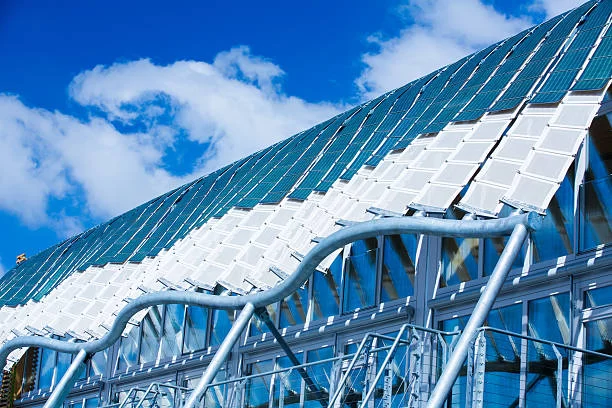Why Flexible Solar Panels are the Future of Solar Energy
As solar energy continues to rise in popularity, new advancements in technology are shaping how we capture and use this powerful renewable resource. One of the most exciting innovations in this field is flexible solar panels. Unlike traditional solar panels, these lightweight and bendable panels offer versatility and potential uses that go beyond conventional solar installations. In this post, we’ll dive into what flexible solar panels are, their benefits, and why they’re rapidly becoming a preferred option for many solar energy users.

What Are Flexible Solar Panels?
Flexible solar panels are made from thin-film solar cells, which allow them to be lighter, more portable, and adaptable to various surfaces compared to traditional rigid panels. They can bend to fit curved surfaces and be installed in places where standard panels would be impractical. This flexibility makes them an ideal choice for people who live on the move or want solar power in spaces that aren’t compatible with conventional panels.
Traditional solar panels, made of silicon, are mounted in fixed positions on rooftops or fields. While they are highly effective, they require a stable, flat surface. On the other hand, flexible solar panels, often made from materials like amorphous silicon, CIGS (copper indium gallium selenide), or other polymer-based materials, can be bent, rolled, or applied to a variety of surfaces like curved roofs, tents, or even backpacks.
The Many Benefits of Flexible Solar Panels
Flexible solar panels come with several benefits that are making them a top choice for a variety of users. Let’s explore some of the biggest reasons why they’re gaining popularity.
- Portability
One of the standout advantages of flexible solar panels is their portability. Unlike heavy, rigid panels that require a structured installation, flexible panels are lightweight and easy to transport. For people who enjoy outdoor adventures like camping or hiking, flexible solar panels can be a great option to power devices on the go. These panels can be rolled up and packed, offering portable power wherever you need it.
Easy Installation
Installing traditional solar panels can be a complicated process, requiring a professional to mount them securely to a flat surface, like a rooftop. In contrast, flexible solar panels can often be installed much more easily. Many of them can be attached with adhesives, Velcro, or simple clips. This makes them a much more user-friendly option, especially for people who don’t have access to professional installation services or who want a quick, DIY solution.
Versatility
Flexible solar panels can be used in places where traditional panels simply can’t go. Their ability to bend and flex means they can be installed on a variety of surfaces, including curved roofs, boats, or even on fabrics like tents. For anyone who needs solar power in less conventional locations—like those living in RVs or boats—flexible solar panels offer the perfect solution.
Durability
While it may seem that flexible solar panel is less durable than their rigid counterparts, they are built to last. Many of these panels are designed to withstand rough conditions, including harsh weather and physical impact. This makes them an excellent option for people who need a reliable, rugged solar solution for outdoor activities or remote areas.
Cost-Effective
Flexible solar panel is often more affordable than traditional panels, especially when you consider the reduced installation costs. Since they don’t require the same mounting equipment and professional installation, the overall investment can be much lower. This cost-effectiveness opens the door for more people to adopt solar energy, even if they don’t have the budget for a full traditional solar panel setup.
How Flexible Solar Panels Work
Like traditional solar panels, flexible solar panels convert sunlight into electricity using photovoltaic (PV) cells. These cells capture energy from sunlight and turn it into usable electrical power. However, because flexible solar panels are made from thinner, more adaptable materials, they don’t always reach the same levels of efficiency as traditional silicon-based panels. But with continuous advancements in technology, the gap in efficiency is closing quickly.
The key to flexible solar panels is the use of thin-film technology. Thin-film solar cells are lightweight and flexible, allowing them to be shaped and molded. While they don’t yet reach the same efficiency as the most advanced rigid panels, their flexibility and ease of use make them an appealing option for a wide range of applications.
Real-World Applications of Flexible Solar Panels
With their growing popularity, flexible solar panels are finding their way into a variety of real-world uses. Here are just a few places where you’ll see them making a big difference.
Camping and Outdoor Adventures
For outdoor enthusiasts, flexible solar panels l is a game-changer. They allow campers and hikers to bring portable, renewable energy with them on their adventures. Whether it’s powering up a phone, charging a portable battery, or even running small appliances, these panels can keep you connected even in remote locations.
Boats and RVs
Flexible solar panels are perfect for people who live life on the road—or water. They can be installed on the curved roofs of RVs or the decks of boats to provide a constant source of renewable energy while traveling. This is especially important for those who want to live off-grid, as it allows them to reduce their dependence on traditional energy sources.
Wearable Technology
As technology advances, flexible solar panel is becoming part of wearable tech. Think of backpacks that can charge your phone or jackets with built-in solar panels to keep your devices powered. This is a growing field that’s exploring new ways to integrate solar power into everyday items.
Emergency Power
In disaster situations or areas where power outages are common, flexible solar panels can be a lifesaver. They can be quickly set up to generate power for critical devices and communication systems. Because they don’t require complicated installation, they’re ideal for emergency scenarios where fast, portable power is needed.
The Future of Flexible Solar Panels
With the increasing demand for renewable energy, flexible solar panels are poised to become even more popular in the coming years. As the technology improves, we’ll likely see more efficient and cost-effective flexible panels available on the market. Their versatility makes them an ideal solution for people who want access to solar power in unconventional spaces or those who need portable, on-the-go energy.
The future of solar power lies in innovations like flexible solar panels. These lightweight, adaptable panels make it easier than ever to harness the power of the sun, no matter where you are. Whether you’re looking for a way to live off the grid, need portable energy for your adventures, or simply want to reduce your reliance on traditional energy sources, flexible solar panels are a fantastic option. With their ease of use, affordability, and potential for a wide range of applications, it’s no wonder they’re becoming a key player in the renewable energy landscape.
In conclusion, flexible solar panel is revolutionizing the solar industry by offering a flexible, affordable, and easy-to-install alternative to traditional panels. Whether you’re looking for an energy solution for your RV, boat, or outdoor adventure, these panels provide a new level of convenience and versatility. As technology continues to evolve, we can only expect flexible solar panels to play an even larger role in the future of solar energy.
